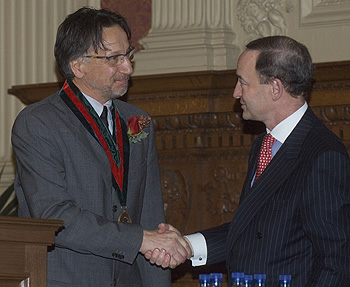Michele Boldrin, Ph.D., was installed as the first Joseph Gibson Hoyt Distinguished Professor of Economics in Arts & Sciences at a formal ceremony Dec. 11, 2007, in Holmes Lounge.
Remarking on the professorship, Chancellor Mark S. Wrighton said: “It is a privilege to announce the creation of the Joseph Gibson Hoyt Distinguished Professorship. As Washington University’s first chancellor, Hoyt is a critical historical figure. He laid the groundwork for the great path this institution has taken, and he developed the University’s strong foundation in the liberal arts. It is wonderful that we have Michele Boldrin as the inaugural holder of this important new professorship.”

Boldrin, who joined the Department of Economics in 2006, is recognized internationally for his contributions to the study of economic theory, economic growth and macroeconomics.
His most recent research is a collaboration with David K. Levine, Ph.D., the John H. Biggs Distinguished Professor of Economics in Arts & Sciences. It focuses on economic growth, innovation and public policy, with particular attention to issues of intellectual property and endogenous fluctuations. A second line of investigation is concerned with intergenerational institutions, such as the family and the welfare state and their actual impact on economic growth and long-run demographics.
This year, Boldrin is teaching courses titled “Innovation and Intellectual Property: Theory and Practice” and “Growth Theories and Growth Models.” His teaching profile includes offerings at both undergraduate and graduate levels, covering topics from growth and development to macroeconomics, from trade and development to public economics and mathematical economics.
“Boldrin’s international reputation is well-earned, and he brings to the Department of Economics a wealth of teaching and research experience,” said Edward S. Macias, executive vice chancellor, dean of Arts & Sciences and the Barbara and David Thomas Distinguished Professor in Arts & Sciences.
Boldrin earned a Laurea degree from the Universita Ca’ Foscari di Venezia (Italy) and a doctorate in economics from the University of Rochester. He joined the University after a seven-year tenure at the University of Minnesota, where he also served as director of graduate studies.
Previously, he held faculty positions at the University of Chicago; University of California, Los Angeles; Northwestern University; and Universidad Carlos III (Madrid). He was an external faculty member at the Santa Fe Institute from its inception in 1987 through 1997, serving as director of the economics program from 1989-1990.
In addition, Boldrin has served as a visiting professor at Stanford University; University of Pennsylvania; Academia Sinica; Hong Kong University of Science and Technology; Chinese University of Hong Kong; University of Chicago; Universita’ Bocconi (Milano); Institute for Advanced Study at Wuhan University (China); Kyoto University (Japan); Instituto Tecnológico Autónomo de México; and Instituto Nacional de Matematica Pura e Aplicada (Rio de Janeiro).
Joseph Gibson Hoyt was the University’s first chancellor, from the creation of the office in 1858 through 1862, when the first students graduated in June. His charge upon accepting the position was to develop the college. Hoyt believed that of all elements of the University, “the first and most important is the college, which should give students a strong foundation in the liberal arts.”
Under his leadership, the University defined curricular requirements for degrees, created professorships in several areas and expanded the physical plant. Prior to the chancellorship, Hoyt earned distinction as professor of mathematics and natural philosophy at Phillips Exeter Academy in Exeter, N.H.